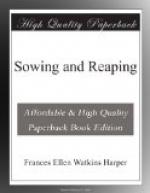In a large city with its varied interests, one event rapidly chases the other. Life-boats are stranded on the shores of time, pitiful wrecks of humanity are dashed amid the rocks and reefs of existence. Old faces disappear and new ones take their places and the stream of life ever hurries on to empty where death’s waters meet.
* * * * *
At the next sitting of the Court John Coots was arraigned, tried, and convicted of murder in the first degree. His lawyer tried to bring in a plea of emotional insanity but failed. If insane he was insane through the influence of strong drink. It was proven that he had made fierce threats against the life of Loraine, and the liquor in which he had so freely indulged had served to fire his brain and nerve his hand to carry out his wicked intent; and so the jury brought in its verdict, and he was sentenced to be executed, which sentence was duly performed and that closed another act of the sad drama. Intemperance and Sensuality had clasped hands together, and beneath their cruel fostering the gallows had borne its dreadful fruit of death. The light of one home had been quenched in gloom and guilt. A husband had broken over the barriers that God placed around the path of marital love, and his sun had gone down at mid-day. The sun which should have gilded the horizon of life and lent it additional charms, had gone down in darkness, yes, set behind the shadow of a thousand clouds. Innocent and unoffending childhood was robbed of a father’s care, and a once happy wife, and joyful mother sat down in her widow’s weeds with the mantle of a gloomier sorrow around her heart. And all for what? Oh who will justify the ways of God to man? Who will impress upon the mind of youth with its impulsiveness that it is a privilege as well as a duty to present the body to God, as a living sacrifice holy and acceptable in his sight. That God gives man no law that is not for his best advantage, and that the interests of humanity, and the laws of purity and self-denial all lie in the same direction, and the man who does not take care of his body must fail to take the best care of his soul; for the body should be temple for God’s holy spirit and the instrument to do his work, and we have no right to defile the one or blunt the other and thus render ourselves unfit for the Master’s service.
Chapter XIV
Belle Gordon’s indignation was thoroughly aroused by hearing Mary Gough’s story about the loss of her hair, and she made up her mind that when she saw Joe Gough she would give him a very plain talking.
“I would like to see your husband; I would just like to tell him what I think about his conduct.”
“Oh,” said Mary, her pale cheek growing whiter with apprehension; “That’s his footsteps now, Miss Belle don’t say anything to him, Joe’s as good and kind a man as I ever saw when he is sober, but sometimes he is really ugly when he has been drinking.”




